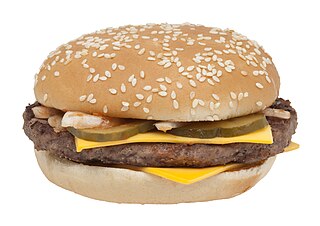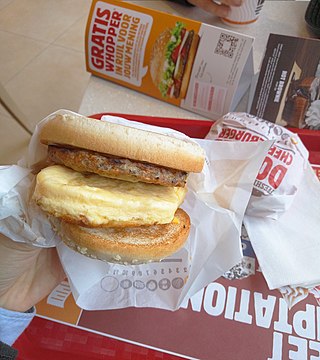
A hamburger, or better known as a burger, is a food consisting of fillings—usually a patty of ground meat, typically beef—placed inside a sliced bun or bread roll. Hamburgers are often served with cheese, lettuce, tomato, onion, pickles, bacon, or chilis; condiments such as ketchup, mustard, mayonnaise, relish, or a "special sauce", often a variation of Thousand Island dressing; and are frequently placed on sesame seed buns. A hamburger patty topped with cheese is called a cheeseburger.

A sausage is a type of meat product usually made from ground meat—often pork, beef, or poultry—along with salt, spices and other flavourings. Other ingredients, such as grains or breadcrumbs may be included as fillers or extenders.

Breakfast sausage is a type of fresh sausage, typically made from pork, that is a common breakfast food in the United States. In the United States, the predominant flavorings used for seasoning are black pepper and sage. There are also varieties seasoned with maple syrup or cayenne pepper. Some breakfast sausage is flavored with cured bacon.

Pork roll is a processed meat commonly available in New Jersey and neighboring states. It was developed in 1856 by John Taylor of Trenton, and sold as "Taylor's Prepared Ham" until 1906. Though since then food labeling regulations require Taylor and all other manufacturers to label it "pork roll", people in northern New Jersey still refer to it as "Taylor ham". The "Is it pork roll or Taylor ham?" question is a notable element of New Jersey culture, and the division over what name one uses divides the state along roughly north–south geographic lines. A 2016 reader poll including more than 70,000 respondents from all 565 municipalities across New Jersey found that the dividing line straddled the Union–Middlesex county border in the east and followed Interstate 78 through the middle of Somerset and Hunterdon counties in the west.

Tyson Foods, Inc. is an American multinational corporation based in Springdale, Arkansas that operates in the food industry. The company is the world's second-largest processor and marketer of chicken, beef, and pork after JBS S.A. It annually exports the largest percentage of beef out of the United States. Together with its subsidiaries, it operates major food brands, including Jimmy Dean, Hillshire Farm, Ball Park, Wright Brand, Aidells, and State Fair. Tyson Foods ranked No. 79 in the 2020 Fortune 500 list of the largest United States corporations by total revenue.

The Sara Lee Corporation was an American consumer-goods company based in Downers Grove, Illinois. On July 4, 2012, Sara Lee Corporation was split into two companies: one for North American operations renamed Hillshire Brands, the other for international beverage and bakery businesses named D.E Master Blenders 1753.
Hot Pockets is an American brand of microwaveable turnovers generally containing one or more types of cheese, meat, or vegetables. Hot Pockets was founded by Chef America Inc. Since April 20, 2002, they have been produced by Nestlé.

Pinnacle Foods, Inc., is a packaged foods company headquartered in Parsippany, New Jersey, that specializes in shelf-stable and frozen foods. The company became a subsidiary of Conagra Brands on October 26, 2018.

Rustlers are a range of hamburgers and hot sandwiches made by Kepak, a company based in Dublin, Ireland. Each product in the range comes packed with a sachet of sauce appropriate for the food. Several products are now also packaged with a slice of processed cheese and/or a rasher of bacon.

Hillshire Farm is an American brand of meat products marketed and owned by Hillshire Brands. The company was founded in 1934, and was purchased by Sara Lee Corporation in 1971. Friedrich (Fritz) Bernegger, born in Austria, started the business at the facility in New London, Wisconsin.

Premium Brands Holdings Corporation is a Canadian specialty food manufacturing and distribution company. It is a publicly traded corporation on the Toronto Stock Exchange.

A breakfast sandwich is any sandwich filled with foods associated with breakfast. Breakfast sandwiches are served at fast food restaurants and delicatessens, sold in supermarkets, or commonly made at home. Different types of breakfast sandwich include the bacon sandwich, the egg sandwich, and the sausage sandwich; or various combinations thereof, like the bacon, egg and cheese sandwich. The breakfast sandwich is related to the breakfast roll.
When the predecessor of international fast food restaurant chain Burger King (BK) first opened in 1953, its menu predominantly consisted of hamburgers, French fries, soft drinks, milkshakes, and desserts. After being acquired by its Miami, Florida franchisees and renamed in 1954, BK began expanding its menu by adding the Whopper sandwich in 1957, and has since added non-beef items such as chicken, fish, and vegetarian offerings, including salads and meatless sandwiches. Other additions include a breakfast menu and beverages such as Icees, juices, and bottled waters. As the company expanded both inside and outside the United States, it introduced localized versions of its products that conform to regional tastes and cultural or religious beliefs. To generate additional sales, BK occasionally introduces limited-time offers of special versions of its products, or brings out completely new products intended for either long- or short-term sales. Not all of these products and services have been successful; in 1992, Burger King introduced limited table service featuring special dinner platters, but this concept failed to generate interest and was discontinued.
McDonald's Corporation is the world's largest chain of fast food restaurants, serving around 68 million customers daily in 119 countries. McDonald's traces its origins to a 1940 restaurant in San Bernardino, California. After expanding within the United States, McDonald's became an international corporation in 1967, when it opened a location in Richmond, British Columbia, Canada. By the end of the 1970s, McDonald's restaurants existed in five of the Earth's seven continents; an African location came in 1992 in Casablanca, Morocco.

Beyond Meat, Inc. is a Los Angeles–based producer of plant-based meat substitutes founded in 2009 by Ethan Brown. The company's initial products were launched in the United States in 2012. The company went public in 2019, becoming the first plant-based meat analogue company to go public.

International fast-food restaurant chain Burger King and its Australian franchise Hungry Jack's have had a variety of breakfast sandwiches in their product portfolio since 1978. The Croissan'wich was the first major breakfast sandwich product introduced by the company.













